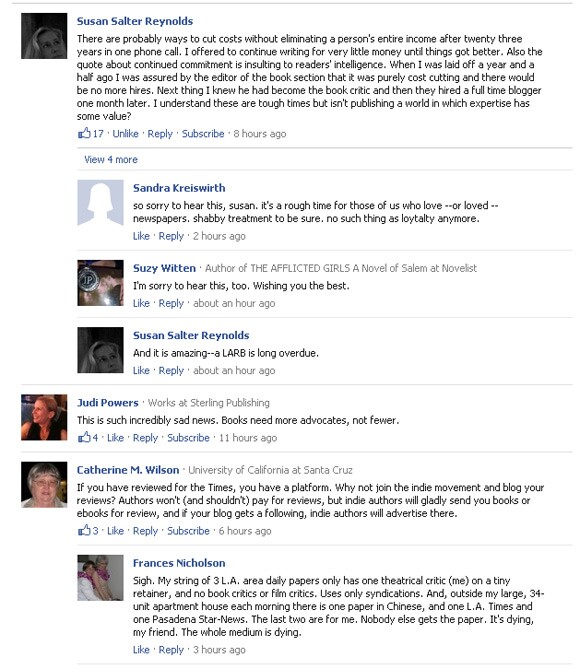End Times at the L.A. Times?

It's long been a general L.A. media axiom that The Los Angeles Times' best days were behind it, but, as Edward James Olmos tells Harrison Ford at the end of Blade Runner: "It's too bad she won't live... But then again, who does?" The Times' decline may have been unduly hastened by poor corporate governance (that would be a link to the Wikipedia page for Sam Zell you're hovering over there), but the paper is also just another casualty of the larger structural realignment that is afflicting the profits and readerships of print media worldwide. That layoff bell you hear emanating from Downtown, humble writer/editor/journo/reporter? Wait long enough and it may start tolling for thee.
The interconnectedness of our fortunes (or at least of our Facebook friends and Google+ circles) may be why the cuts were not even done before initial reports about them began to appear at LA Observed, Fishbowl LA and Publishers Weekly, the personal blog of summer-vacationer Tony Pierce. Fired books columnist Susan Salter Reynolds weighed in on her own situation via the PW comments, where SGV Valley News Group theater columnist Frances Baum Nicholson joined the consensus lament over the general state of arts and literary coverage in the region:

(Los Angeles may be the "Entertainment Capital of the World," but apparently the strain of this achievement has left us unable to claim "Arts Journalism Capital" as well.)
For those of us in public media, the woes of our commercial cousins (kissing cousins, really; the membrane that separates our demimondes has never been particularly impermeable to individual journalists) provide both a neverending wake-up call and reaffirmation of our mission. It's not a state secret that the basic pitch public media makes to the audience is that it will provide media that the for-profit system either can't or won't. An initiative like KCET's SoCal Connected exists (and, if awards are any tally, thrives) against the backdrop of dismal accountings of local TV news coverage like the Normal Lear's Center's periodic surveys. Similarly, the mere existence our recently announced ARC arts project (funded in part by the L.A. County Arts Commission and involving potential partners such as USC's Annenberg School) implies not-so-subtly that there is important cultural reporting falling through the cracks of existing media. (For the record, the irony of the preceding link to the LAT does not escape me.) Overall, though, public media hasn't the resources, scope or leeway to do all things the thriving commercial press once did, making the loss of talented, seasoned reporters at institutions like the Los Angeles Times an often irrevocable one. We may not be physically living in the dystopia depicted in Ridley Scott's iconic vision of Los Angeles, but media-wise we may already be there.
Here's that Blade Runner clip, btw: